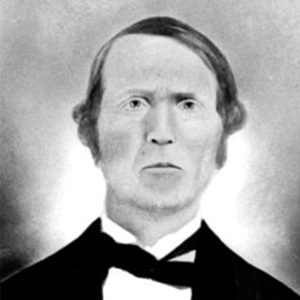 Henry Tucker (December 13, 1826 – February 10, 1882)
Henry Tucker (December 13, 1826 – February 10, 1882)
Like so many composers before and since, Henry Tucker is unfortunately remembered today for just a few great songs. But they were indeed great! From a jolly jingle which tells a cross-dressing story of a Confederate President, to a musical hit which would come to symbolize an era, his music was equally brilliant and popular.
He was born north of the border in Kingston, Ontario, although the family soon relocated to Auburn, NY, where he was raised and learned to play the guitar, piano and organ. He enjoyed a relatively happy childhood which was hindered only slightly by a mild disability meaning he would walk with a cane his entire life. He also developed into a fine singer and enjoyed his first major public performance in Skaneateles at the age of sixteen.
He lived for two years in Geneva, NY where he held the position of organist at the Reformed Dutch Church, but by 1850 he had returned to Auburn and set about a career as a music teacher. However, composition was increasingly important to him, and he decided to pursue this with a move to New York City in 1860. Here, he worked as a professional singer and a professor of music, and increased his catalogue of songs to more than 121. He died in Brooklyn in 1882 at the age of 55.
Musical Style and Influences
Contents
His musical style offered something for everybody. In a time of national divide he was able to compose songs which pleased both North and South, and his works were to be heard as much in the church as in the parlour.
He was well known for his soulful playing and delighted his listeners whilst improvising on the piano or guitar, or playing organ voluntaries in the church.
What was Henry Tucker Known For?
The Music of Henry Tucker
His best-known song is “Sweet Genevieve”, first published in 1869. The song was linked to a (false) claim by it’s lyricist George Cooper that its words had been influenced by his own beloved, departed wife Genevieve. Such personal, romantic connections assisted songs to become best-sellers in the mid-19th Century, and he must have felt that this justified his small falsehood.
However, before the song reached stardom, Cooper sold the lyrics to Henry Tucker for the sum of five Dollars, and would never reap the song’s bountiful rewards. Between 1930 and 1958 the song appeared in almost thirty films.
Another great hit, “Weeping, Sad and Lonely” (1868) has the alternative title “When This Cruel War is Over” and was another song which struck the hearts of all Americans, regardless of their political persuasions. It appears in the timeless movie classic “Gone With The Wind”.
Henry Tucker Most Famous Works
Surely the most amusing work in the catalogue is another Cooper-Tucker collaboration, “Jeff in Petticoats” (1865). The legend goes that Confederate President Jefferson Davis, whilst attempting to evade capture, had fled from a tent in the middle of the night wearing his wife’s clothing.
His later claim that he had mistakenly grabbed the female garments in panic was, naturally, less popular in the north than the notion of any cross-dressing tendencies.
